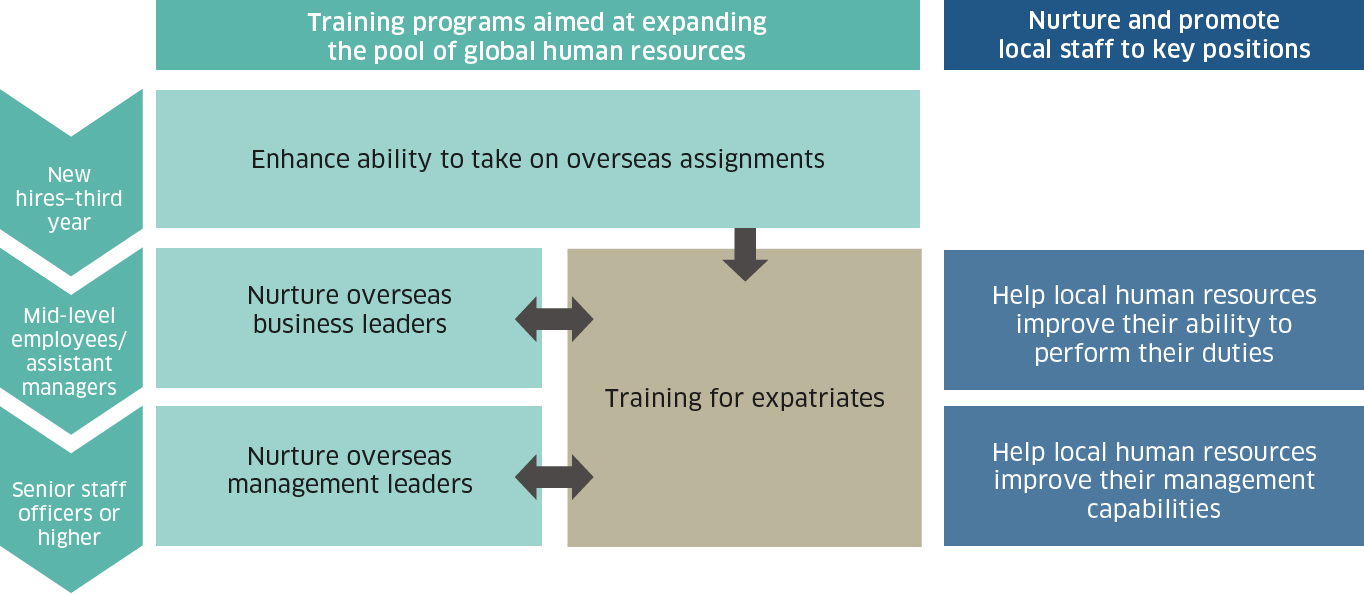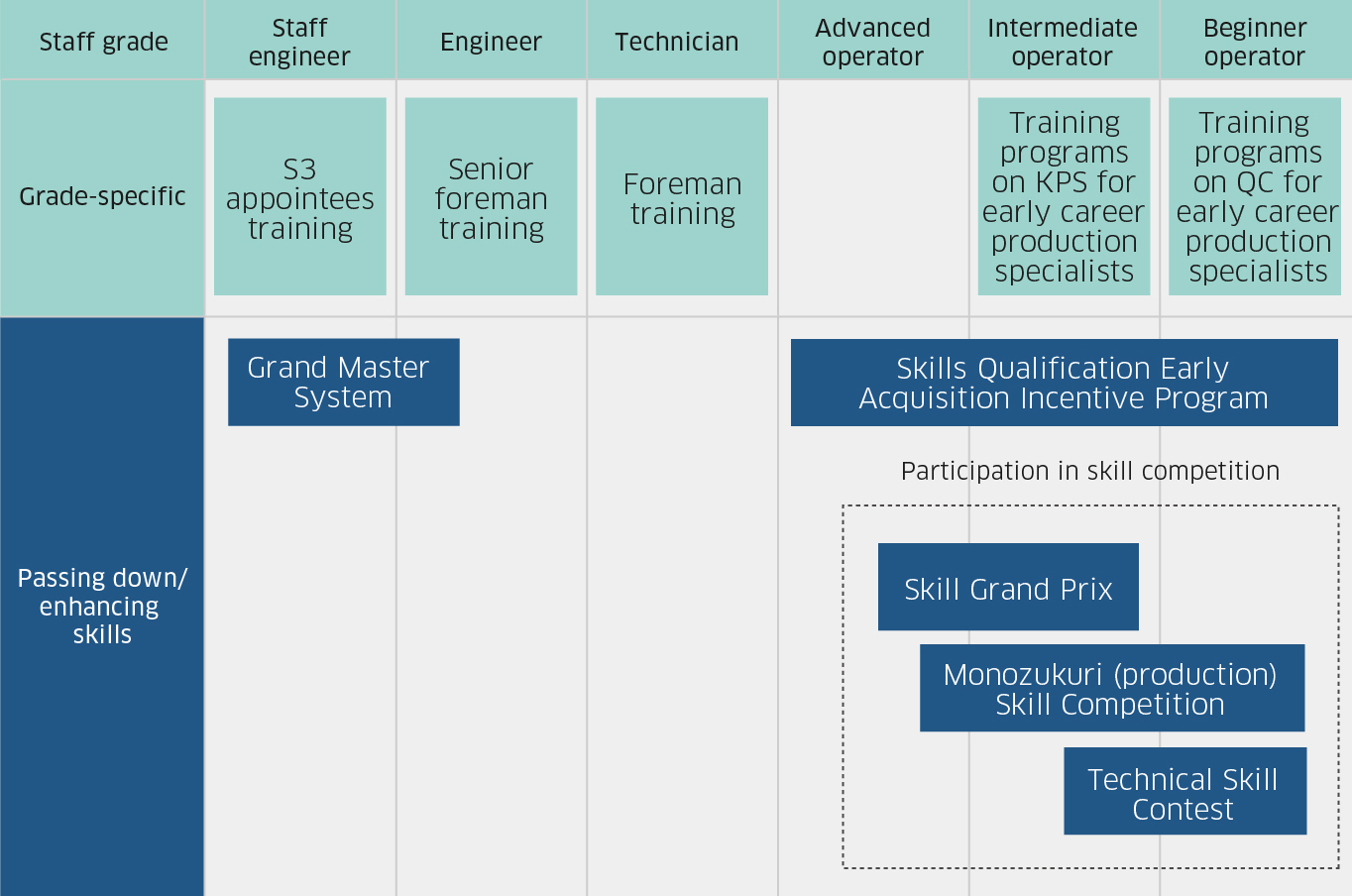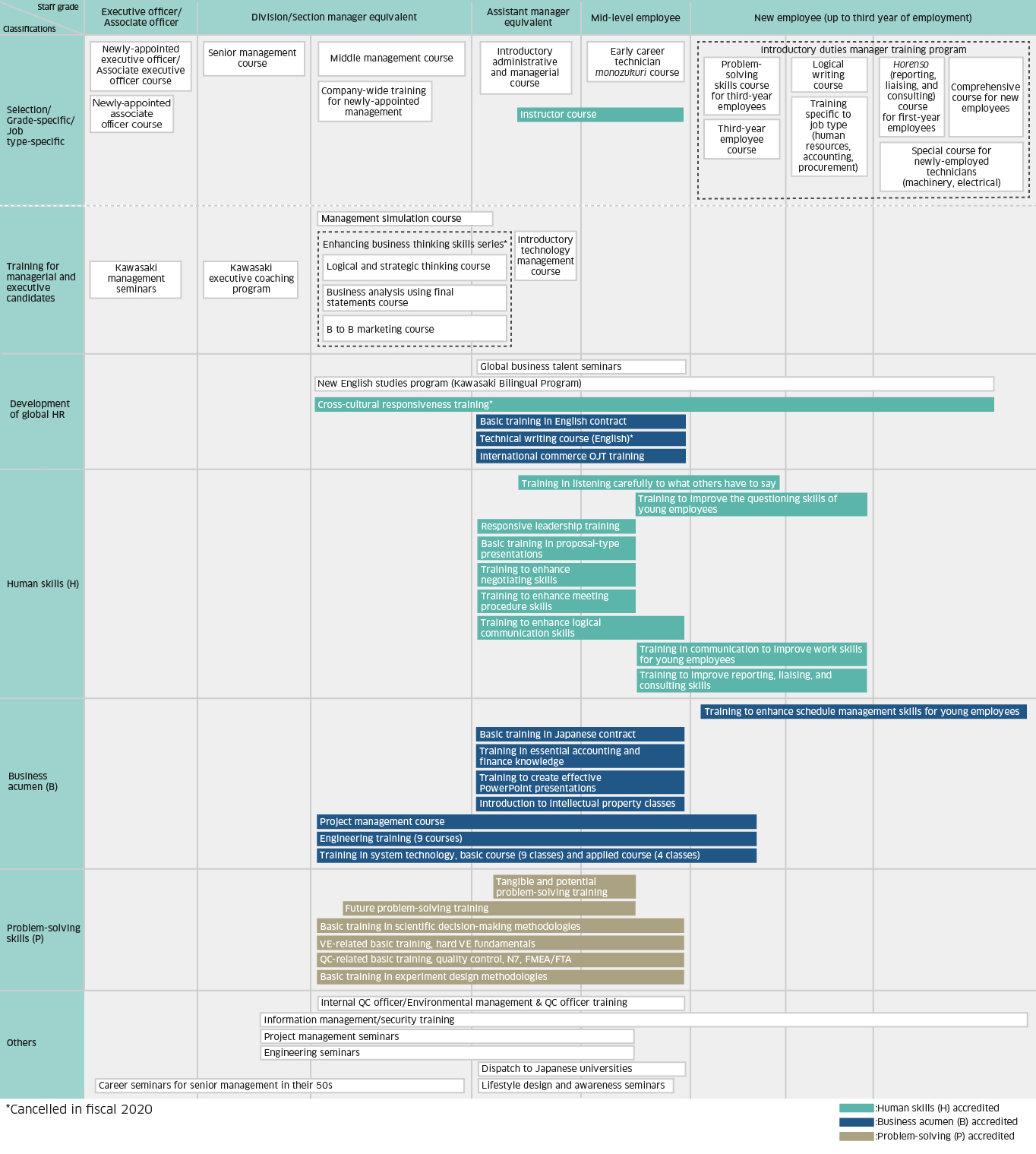Human Resource Development
- Management Approach
- Human Resource Development Programs
- Amounts Invested in Human Resource Development
Management Approach
Our Basic Stance
In order for us to continue our business and grow while conducting global business, all of our employees must efficiently, effectively, and completely achieve specific targets in line with our management policy and Company-wide actions. It is the “people” of a company who use their minds and act to achieve specific goals, so the development and invigoration of human resources is the most critical factor for the growth and advancement of our company. The Kawasaki Group Human Resources Policy, the Group’s fundamental policy on human capital, also declares our commitment to achieving employee career fulfillment through a deep appreciation for every employee and the provision of opportunities to unlock their potential and contribute to society by taking on challenges and pushing themselves to grow further. Based on the above, the Kawasaki Group conceptualizes the development of human resources as follows:
- We carry out human resource development to grow our corporate performance, and improve our employees’ capabilities as well as their purpose in life.
- OJT (on-the-job training), self-development, and rotation are the foundations of human resource education.
- Off-JT is provided to support these activities in ways where the results of Off-JT can be practically applied in the workplace.
- The line manager is responsible for human resource education.
- Human resource education is to be conducted on an individual basis in a planned manner and on an ongoing basis.
- Opportunities for developing one’s abilities are provided to all employees from the time they are newly employed up to the time of their retirement.
Desirable Employee Attributes
The Kawasaki Group aims to nurture individuals equipped with sophisticated expertise and wide-ranging experience. To this end, we will systematically nurture future leaders, including executive candidates, while strengthening project risk management and developing global human resources. Specifically, we will provide consistent training and strengthening at all levels with the aim of realizing the following six desirable human resource attributes set out in our Kawasaki Group Mission Statement:
- Human resources capable of being active globally
- Human resources capable of solving the challenges of society and customers
- Human resources capable of supporting change and innovation
- Human resources capable of upgrading their expertise
- Human resources capable of displaying overall competence
- Human resources with a constant profit-oriented perspective
Structure
We have in place the Human Capital Development Department within the Human Resources Division. Also, common Group-wide education and training, such as level-specific development for junior employees, top management or other levels and training to foster globally capable human resources, is planned and executed by the Head Office Human Resources Division. In addition, the business segments each plan and execute education and training related to the particular abilities and skills required in their respective areas of business.
|
Human Resource Development Programs
Reinforce the Management and Business Execution Capabilities of Employees (Training for administrative and technical personnel)
During their first three years of employment, employees in administrative and technical positions receive a combination of structured OJT based on a mentoring program and a range of training content designed to help young employees develop their capabilities as quickly as possible. The mentoring program is a system that assigns a dedicated mentor for the first three years after an employee joins the company to provide intentional, planned, and continuous guidance through OJT on the attitudes, knowledge, and skills necessary for job performance. We recommend that mentors be selected from among assistant managers, and we provide training for the mentors. Furthermore, we provide programs that target employees on a wide range of levels including the Kawasaki management seminars and Kawasaki executive coaching programs, which are designed to train executive candidates; the senior management course and middle management course, aimed at enhancing the capabilities of mid-level managers and section heads; and the 360-Degree Surveys, which are designed to develop awareness of strengths and areas requiring improvement by managerial and higher-level staff. We also develop human capital through means other than training, such as emphasizing the importance of communication to foster skills development in the execution of routine duties. In particular, individuals have quarterly one-on-one meetings with their supervisors and share their goals within their sections using a special sheet, titled the Challenge & Commitment Sheet, which includes the challenges they are taking on and their commitments.
Performance of Major Grade-specific Training Programs Held by Head Office (consolidated domestic; exceptions apply)
(FY)
| Unit | 2020 | 2021 | 2022 | 2023 | 2024 | ||
|---|---|---|---|---|---|---|---|
| New employee training | Participants | Persons | 344 | 232 | 230 | 278 | 343 |
| Total hours | Hours | 15,136 | 10,208 | 10,105 | 10,008 | 13,720 | |
| Training for new section managers | Participants | Persons | 103 | 140 | 139 | 138 | 136 |
| Total hours | Hours | 4,944 | 7,140 | 7,020 | 7,176 | 7,072 | |
| Training for new senior managers | Participants | Persons | 36 | 39 | 38 | 45 | 46 |
| Total hours | Hours | 1,512 | 1,521 | 1,510 | 1,800 | 1,840 | |
| Kawasaki executive coaching program* | Participants | Persons | 9 | 30 | 29 | 30 | 30 |
| Total hours | Hours | 1,152 | 4,080 | 4,120 | 4,080 | 4,080 | |
| Kawasaki management seminars | Participants | Persons | 121 | 103 | 0 | 50 | 0 |
| Total hours | Hours | 242 | 206 | 0 | 100 | 0 | |
* The participant target for the Kawasaki executive coaching program, which aims to expedite the training of executive candidates, was lowered from senior manager equivalent to section manager equivalent in fiscal 2021, with the number taking the classes increasing from 9 to 30 persons.
Training Structure for Administrative and Technical Personnel
Development of Global Human Resources
We have been implementing measures for global human resource development with the objective of further developing human resources who can support global business execution. Specifically, in addition to the global business talent seminars, we implement an overseas internship system and Asian business training program aimed at globalizing domestic human resources. Through these initiatives, we focus not only on the acquisition of skills, such as English, but also on training to facilitate a deeper understanding of different cultures, on-site practical training to learn about the realities of business in overseas settings, and selective training programs. We also provide training support for local engineering employees at overseas sites and are expanding our global human resource development measures. Furthermore, we created the Kawasaki Bilingual Program, an English training program designed to assist self-motivated study. This represents yet another example of our efforts to develop an environment in which employees with career ambitions are supported by a diverse lineup of English training programs and empowered to pursue their goal of becoming global human resources.
Global Business Talent Seminars
In light of our business environment, specifically the fact that 60% of the Group is engaged in global business, we conduct seminars to instill a certain level of mental preparedness to work from a global perspective and gain skills related to overseas business. The young and mid-level employees from global business departments who comprise the participants of these seminars learn to acquire the mindset of a global perspective as well as decision-making criteria. They also obtain effective knowledge of business needed for global operations, including export management and financial knowledge, forming a diverse team to move our business forward. It is our hope that this program will be one key to achieving an open-minded, free-thinking, and creative team that goes beyond the boundaries of internal and external organizations and of product/service categories, leveraging our rich diversity—which is one of the main tenets of our Group Vision 2030 for the development of our business. Nineteen out of a total of 24 participants from fiscal 2024 were engaged in overseas business as of March 2025.
Our Structure for Nurturing Global Human Resources

Performance of Major Global HR Training Programs Held by Head Office (consolidated domestic; exceptions apply)
(FY)
| Unit | 2020 | 2021 | 2022 | 2023 | 2024 | ||
|---|---|---|---|---|---|---|---|
| Global business talent seminars | Participants | Persons | - | 15 | 15 | 18 | 24 |
| Total hours | Hours | - | 765 | 750 | 972 | 1,296 | |
| English-language skills series*1 | Participants | Persons | 19 | 12 | 15 | 13 | 16 |
| Total hours | Hours | 161 | 242 | 250 | 227 | 335 | |
| English-language writing series*2 | Participants | Persons | - | 23 | 20 | 34 | 24 |
| Total hours | Hours | - | 345 | 320 | 449 | 384 | |
Note: Language programs are also provided at each workplace.
*1 English-language skills series: Meeting (reading aloud and practical exercises), presentation, and negotiation training
*2 English-language writing series: Business writing training and email writing from the elementary stage
Bolstering Middle Management
The key to achieving Group Vision 2030 is for middle management—based on an understanding of overall policy of management strategy—to encourage modification of the actions in each division. As they move away from the “playing manager” and gain understanding of the mission of each division, they also train subordinates and at the same time strive to achieve the goals of the company vision as far as possible. By boldly addressing these issues, they are moving toward boosting their management capacity. Through these training programs for senior and middle management, we are working to develop the management-level employees.
Middle Management Course
The role of middle management is to achieve the goals of their division and to train their subordinates. The Middle Management Course has been in place since 2019 to raise awareness of the current circumstances and issues in carrying out the role and to acquire the leadership action and management skills required to reach these goals. Specifically, by looking back at their own leadership actions, participants deepen their self-awareness, understand the current circumstances of the organization, and learn about communication skills to facilitate self-initiated action by subordinates. This program is also implemented to accurately define our issues and set up an action plan to resolve them with a view to achieving the vision of the organization.
Project Manager Training
In recent years, we have seen a rise in project-oriented businesses with contracts for entire systems, including peripheral facilities, as opposed to standalone products. Accordingly, we introduced new training programs in fiscal 2016 to secure project managers able to execute such projects. The entire Group is working to enhance its project management capabilities, to this end holding Project Management Seminars to which we invite individuals from inside and outside the company with previous experience in large-scale projects as lecturers to impart the know-how required to lead projects to success, and the Project Management Course to acquire a systematic knowledge of project management.
Nurturing Executive Successors (Kawasaki Executive Coaching Program)
We are nurturing human resources who can assume executive positions and contribute to the medium-to long-term enhancement of our enterprise value amid an increasingly harsh business environment. To this end, our pipeline of candidates encompasses an extensive scope of job ranks, ranging from assistant managers to executive officers, while our training programs are designed to address differing issues in light of their staff grades. As a specific initiative, we hold the Kawasaki executive coaching program (spanning nine months per fiscal year) for executive candidates selected from section manager equivalents. In addition to instilling participants with corporate management expertise, the program facilitates a deepened understanding of the true nature of corporate management at Kawasaki Group. This is achieved through deliberations involving external lecturers and corporate managers from outside the Kawasaki Group, as well as numerous group discussions. Using these means we aim to nurture in executive-level human resources the capacity to embody our corporate philosophy by equipping them with optimal perspectives on the Group as a whole, as well as global perspectives on corporate management, toward the resolution of managerial challenges.
Fostering the Human Resources Who Will Be the Drivers of Growth
To make the shift to a more growth-oriented business structure as outlined in the Group Vision 2030, it will be essential that we develop and acquire personnel who can carry out digital transformation (DX) and business exploration human resources who will serve at the core of the transformation. To enable the utilization of rapidly advancing AI and digital technologies in business operations, we are expanding programs for employees to learn digital technologies such as AI, data science, IT, and software development as well as data utilization. We are also providing content for acquiring IT passport-level literacy in stages. To develop business exploration human resources, we conduct programs that foster a mindset of engaging in business development and encourage individual exploratory behavior, and we are promoting the establishment of programs covering everything from business development fundamentals to practical application.
Strengthening On-site Capabilities (Training for Production Specialists)
The production sites of each business are the backbone of the Group that generates profit, making reinforcement of on-site capabilities extremely important. For young production specialists, we conduct the Skills Qualification Early Acquisition Incentive Program and basic KPS* and quality control training programs for learning about Kawasaki’s production systems. To reinforce the leadership skills of supervisors, we provide senior foreman and foreman training. We also established the Traditional Skill Master System, which certifies skilled production specialists with advanced and specialized skills as Traditional Skill Masters to systematically pass down their skills to successors in the same workforce. Through the system, we are promoting the transmission and enhancement of front-line production skills at production sites. In fiscal 2025, four Traditional Skill Masters are taking action to pass on their skills. In addition, we actively participate in outside skills competitions, including the Skill Grand Prix and Hyogo Monozukuri (production) Skill Competition, achieving excellent results. In fiscal 2024, a Kawasaki employee placed first in the lathe category of the Hyogo Monozukuri (production) Skill Competition.
* KPS: The Kawasaki Production System, a proprietary production system developed by Kawasaki
Fiscal 2024 Medal Results
| Competition | Event | Result |
|---|---|---|
| 2024 Hyogo Monozukuri (production) Skill Competition | Lathe | First place |
Training Structure for Production Specialists

Note: Only those programs, etc. targeted at all Group companies and hosted by Head Office are included
Other Initiatives to Strengthen On-site Capabilities
- Technical Skill Contest
In recent years, ensuring that the skills are passed down to the next generation has become a pressing issue, and Kawasaki is focusing efforts on education and developing the skills of young employees. Every year, young employees from production sites in and outside Japan gather at the Akashi Works for the Technical Skill Contest to compete against one another using skills they have honed at their work sites. Young technicians from Japan and several other countries take part, demonstrating their skills to the fullest as they compete with and learn from each other. The program has been postponed since fiscal 2020 in order to prevent the spread of the COVID-19, but we are considering resuming it in fiscal 2025. By way of these kinds of initiatives, we continue to work to boost and maintain technical skills throughout the entire Group. - Creating Opportunities to Pass Down Skills
Aggressively promoting the transfer of technical skills to enhance production capabilities, the bedrock of our business activities, is essential. To this end, we opened Takumi Juku, a professional trade skills training center at the Harima Works, in 2012, and Manabiya, a manufacturing skills creation center at the Akashi Works, in 2014. Through synergies between existing skills training systems and the creation of opportunities to pass down technical skills, these centers are delivering results in terms of not only transferring skills, but also of acquiring new skills, quickly developing skills and instructors, and enabling employees to teach and improve one another’s capabilities. - Skills Qualification Early Acquisition Incentive Program
As part of measures to boost on-site capabilities, we have instituted a merit-based pay system to encourage the early acquisition of technical qualifications, and to reward those who obtain these skills promptly. These payments are made based on survey results conducted twice annually, normally in July and December. In fiscal 2024, 72 and 56 production specialists were rewarded under this system in the first and second halves respectively.
Amounts Invested in Human Resource Development
ROI from Human Resources (consolidated global)
(FY)
| Unit | 2020 | 2021 | 2022 | 2023 | 2024 | |
|---|---|---|---|---|---|---|
| Sales (a) | Millions of yen | 1,488,486 | 1,500,879 | 1,725,609 | 1,849,287 | 2,129,321 |
| Sales expenses (b) | Millions of yen | 1,493,792 | 1,455,074 | 1,644,098 | 1,813,094 | 2,004,747 |
| Employee-related expenses (c)* | Millions of yen | 156,707 | 147,460 | 143,971 | 140,457 | 164,277 |
| ROI from human resources (a-(b-c)) /c |
0.97 | 1.31 | 1.57 | 1.26 | 1.76 |
* Salaries, bonuses, and welfare expenses
Contact
If you need more information about our business,
please feel free to contact us.






